Orphan Black: The Cast Talks Season 3 at C2E2
Orphan Black completely dominated Chicago Comics & Entertainment Expo (C2E2) this weekend. Not only were we treated to four of the main cast members, BBC America brought along co-creator John Fawcett to talk all about our favorite sci-fi show. Indeed, in addition to the public panel, I had the chance to sit down separately with Jordan Gavaris, Maria Doyle Kennedy, Dylan Bruce, Ari Millen, and John Fawcett to talk Season Three and what is ahead for Projects Leda and Castor.
Seasons One and Two of the show seemed to focus on Project Leda: we were introduced to the female clones (played brilliantly by Tatiana Maslany), and they became a family of sisters. Season Three continues on that trajectory of family, only this time, the existing main cast puts into focus just how important family loyalty is, and our new Castor clones show us how the military raised the male clones together as brothers.
Jordan Gavaris (Felix) talked about just how important family is to Felix, particularly in relation to his sister, Sarah. “What was interesting to me about this season about Felix is how badly he needs his family together. The risk of fracture is too much. So much so that he adjusts himself. He postures himself to be a source of strength for S just because he needs to hold the family together. He has to keep things together.” “The other option is too painful,” says Maria Doyle Kennedy (Mrs. S). Gavaris continues, “Much too painful, and Sarah and Felix have been in the outs before. There was always an understanding that led them to coming back together. The drama that has happened between the sisters. If you compare where S and Sarah were in the pilot of Season One to where they are 3×1, even though there’s friction, they’re actually closer than they’ve ever been before. That was something I only realized watching everything in retrospect.”
Doyle Kennedy continued to talk about the fact that we learn a lot more about Mrs. S in Season Three, and why she makes the decisions that she does, especially with Kira. “I think that the reason she is who she is and the reason she became who she became was to provide a safe place for vulnerable children. I think that’s what she started doing in London. Her own past was quite troubled and difficult and not the safest place to grow up in. I think that when she went to London she got involved in activism of all kinds but she became kno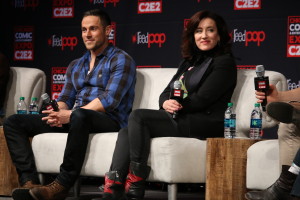 wn as a person who would mind children. And while she did many other mad things, she wasn’t getting drunk minding children. She actually likes a drink occasionally, but not then. I think that’s always been a huge motivation for her. Felix and Sarah will always be her children even though she’s recognizing them as adults, she’s still like a tiger mom. She’s still trying to keep the world safe for them. It’s interesting for me to get beaten up so much [laughs] and to be able to use that. It’s clear from Mrs. S’s backstory that, even if we didn’t know before, that she’s had very hard times. She’s been backed into a corner physically and theoretically before. So, it’s not as if it’s anything new for her but the way that it comes coupled with the reasons for her actions. She gets into a fight, gets out of it and goes forward. This one is different because it was such a hard decision about what she did about the bargain they made on behalf of Sarah and Kira with Helena. She’s obviously very undecided. She’s justifying that to herself still now. So, getting hit really knocks her down. She’s thinking about things in a way that’s really interesting for me. You’ve never really gotten to see her vulnerable before and you do.”
wn as a person who would mind children. And while she did many other mad things, she wasn’t getting drunk minding children. She actually likes a drink occasionally, but not then. I think that’s always been a huge motivation for her. Felix and Sarah will always be her children even though she’s recognizing them as adults, she’s still like a tiger mom. She’s still trying to keep the world safe for them. It’s interesting for me to get beaten up so much [laughs] and to be able to use that. It’s clear from Mrs. S’s backstory that, even if we didn’t know before, that she’s had very hard times. She’s been backed into a corner physically and theoretically before. So, it’s not as if it’s anything new for her but the way that it comes coupled with the reasons for her actions. She gets into a fight, gets out of it and goes forward. This one is different because it was such a hard decision about what she did about the bargain they made on behalf of Sarah and Kira with Helena. She’s obviously very undecided. She’s justifying that to herself still now. So, getting hit really knocks her down. She’s thinking about things in a way that’s really interesting for me. You’ve never really gotten to see her vulnerable before and you do.”
It is interesting to note that as we were talking about the importance of family and the loyalty that Mrs. S feels toward her children, we started talking about how Orphan Black tends to focus on non-nuclear families, such as adopted children, a sisterhood of clones, and we turned our attention to the LGBTQ+ community. Gavaris explains, “I think the conversation [about LGBTQ+] has expanded. I think it has expanded due to the addition of Tony to the show. It included the trans community which was something we really hadn’t had the opportunity to speak to. It’s something I think myself, and Tat, and Maria, because we are all accidental activists and supporters of the gay community and supportive of the LBGTQ culture, it’s just something we take very seriously. And I think responsibility is such a, has such a negative connotation to it because it makes it feel like a burden. There’s no responsibility in representing gay culture, it’s a joy. We’ve felt it across the board, across the team of writers, all the performers of the show. It’s a real joy to get to play people who are brave because there’s an element of bravery and courage being who you are. It’s the hardest thing in life isn’t it? It’s the hardest thing in the world to do. So, to get to play somebody who’s unabashed about who they are, tells you so much about the character you are playing. It inspires you. It gives you permission to be brave in your work. It’s just a source of inspiration. And I think there’s a lot of mythology about what a man and a woman is supposed to be. A lot of mythology about what gay men or gay women are supposed to be. There’s just a lot of storytelling going on about who human beings are and what sexuality or gender identity means to your values as a human, to just the myth of being a human. It’s all just a big lie. It’s a lie that we have been fed for many many years. It’s destructive, and pervasive, it’s exclusionary and I resent it. And I think that if anytime anybody has ever had a doubt about what’s the right course of action; it’s not that hard.”
Doyle Kennedy continued to talk about accidental activism that came from the show. “For me it’s not about the gay rights, it’s human rights. We are about to have a referendum in Ireland and when I go home on the 22nd of May for marriage equality. And again I just can’t understand how anybody can be against that. Obviously there are people who don’t understand it yet, maybe. So, it’s our job to help them understand or to see that it’s not a gay issue it’s a human issue. Just don’t be a dick!”
One of the biggest surprises at the end of Season Two, of course, was the reveal of Project Castor which was the military’s version of male clones. When Ari Millen was cast, he didn’t know that he would be chosen to play all of them. In fact, his character was supposed to be killed off in the middle of the season. I let Millen know that I was cautiously optimistic about his ability to fill the shoes of Tatiana Maslany, who is essentially doing the same as h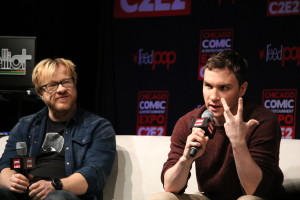 im, but that I was very pleasantly surprised at how great he is playing all of the characters. I asked him how he was able to transition from clone to clone. “For me the biggest challenge is the fact that Project [Castor] was self-aware. They grew up together so I didn’t have a lot of accents to play with. I didn’t have a lot of hair to play with. It was a lot of finding subtleties for me and where I started was the fact that they were brothers and finding the similarities first and then from there exerting their own individual personalities. Rudy is Rudy, Mark is Mark, Seth is Seth, but always coming to that fact that they are a tight knit wolf pack, brothers. For the most part if was a visual process for me because the way they were introduced in the last season. We met them but we didn’t really know who they were at that point. So, the majority of the hiatus, I was formulating in my head what I had seen in the finale and saying. ‘Okay this guy is going to be more like this.’ So, I would come to set and put on my wardrobe and makeup and see who I was for that day, look in the mirror, and drop in from there, and thankfully too, I would get treated differently by those on set. So that certainly helped. Obviously the energy that Rudy has is different from what Mark has and people will respond that way. Also, what I was doing was that I was creating a pecking order in my head about who fell where and trying to create a dynamic of Rudy/Seth, how that dynamic was going to work and the other: what’s that going to be like. Who’s the older brother, who’s the runt, who’s the middle child? That was me trying to figure out their different personalities.”
im, but that I was very pleasantly surprised at how great he is playing all of the characters. I asked him how he was able to transition from clone to clone. “For me the biggest challenge is the fact that Project [Castor] was self-aware. They grew up together so I didn’t have a lot of accents to play with. I didn’t have a lot of hair to play with. It was a lot of finding subtleties for me and where I started was the fact that they were brothers and finding the similarities first and then from there exerting their own individual personalities. Rudy is Rudy, Mark is Mark, Seth is Seth, but always coming to that fact that they are a tight knit wolf pack, brothers. For the most part if was a visual process for me because the way they were introduced in the last season. We met them but we didn’t really know who they were at that point. So, the majority of the hiatus, I was formulating in my head what I had seen in the finale and saying. ‘Okay this guy is going to be more like this.’ So, I would come to set and put on my wardrobe and makeup and see who I was for that day, look in the mirror, and drop in from there, and thankfully too, I would get treated differently by those on set. So that certainly helped. Obviously the energy that Rudy has is different from what Mark has and people will respond that way. Also, what I was doing was that I was creating a pecking order in my head about who fell where and trying to create a dynamic of Rudy/Seth, how that dynamic was going to work and the other: what’s that going to be like. Who’s the older brother, who’s the runt, who’s the middle child? That was me trying to figure out their different personalities.”
Millen also shared that he does not watch the episodes in advance because he likes to share the reactions with his family and friends. He even told the story about how he revealed his part in Project Castor. “I didn’t tell any of my friends and family about the season finale last year because I wanted to sit in the room with them and sort of just see. It was amazing. I told my fiancée and I told my agent. My fiancée started crying, one friend turned to me and his jaw dropped, another started laughing. It was great!”
Even though the casting of Ari Millen as the Castor clones was a surprise, the actual Castor storyline was part of the plan the entire time. Executive producer and co-creator John Fawcett explains how they included Millen into the Orphan Black family. “We took a season to figure out what we were doing. It was a big learning curve: trying to learn how to make cloning believable essentially for the viewer. By the time we got to the beginning of Season Three we felt like we were pretty much professionals. It was kind of fun taking the new guy. And [now]everyone knows what they are doing. We’ve got a crew that’s been tight for three seasons now. And everyone kind of gets what we are doing. It’s great bringing someone new in there and everyone knows their job and see how the crew came together to help with the technical aspects of doing it. It just felt good, this season, from a directorial point of view and knowing I have some experience doing these things. But Ari did an awesome job. If you haven’t seen episode two, it’s a big showcase for him and for the cast of the clones. The new facet of Orphan Black.”
According to Dylan Bruce (Paul), we also get to find out even more about Paul’s story, and perhaps get some clues as to whose side he is really on. He explains what the biggest surprise was for him this season. “For me, personally, I understand why he did all the bad things that he did […] I understand what the ultimate goal of the character is and why he was doing what he was doing. He makes some big decisions this year. Good or bad but they have huge repercussions. I’m really proud of the character this season. Proud that I understood my intentions. Sometimes there was that scene when he’s Rachel’s new monitor and henchman and having conflicting feelings and I was like, ‘What are you guys doing to me? I’m irredeemable after this.’ He was doing this for a reason. That purpose makes a lot more sense to me now that we’ve shot season three. But I was questioning quite often. It’s always a tug-of-war with every character. That’s just the beauty of our show.”
Fawcett ended our discussion by talking about how Orphan Black is a different kind of sci-fi show. “I like all sorts of sci-fi. I like spaceship sci-fi and time travel sci-fi, and fantasy sci-fi but I also like sort of like very real, like the science fiction is happening amongst everyday people and it works in laying a template of paranoid thriller. What was important from the beginning was to build characters that were very multi-faceted, so that you could really believe that this could happen. Like you take a really dumb and absurd premise like cloning and actually believe it, really believe it. Not just watch something for entertainment value. You actually kind of invest in the whole thing. I think that makes genre television really interesting and important. The other thing important to me was that it just wasn’t going to be sci-fi, I just wanted to go in a bunch of different directions. I wanted to show where it could be a conspiracy thriller, and I was also like I can be silly, it could be a horror. And trying to get the audience to go along with it. And the way they go along with that is because there are huge tone shifts from scene to scene. [For example] Alison’s world is idiotically funny, and then this world is scary, and Helena’s got a dripping knife as if being in some horror show. What makes that all gel together is that you buy the characters. You believe their motivations. You believe them as real people. That’s what’s fun about the show. I love the genre mash-up. I could never figure out what Orphan Black was, but that’s what it turned out to be. So that’s what makes it fun to go to work.”
All in all, it sounds like there will be even more action, thrills, and surprises in Season Three. I had a wonderful time talking these incredible people. And thanks to our own Pearl for taking the photos at the official panel!
Author: Erin
Erin has reviewed many shows over the years including Orphan Black, iZombie, Penny Dreadful, and Killing Eve. She has a keen eye for on-screen chemistry, and loves to tackle the subject of casting. She is also our horror aficionado. She live tweets shows, and loves to share her feelings. Erin has a BA in History, and likes to analyze the lore behind historical fiction. She attends San Diego Comic Con every year and has also attended C2E2 and WonderCon.
Help support independent journalism. Subscribe to our Patreon.
Copyright © The Geekiary
Do not copy our content in whole to other websites. If you are reading this anywhere besides TheGeekiary.com, it has been stolen.Read our

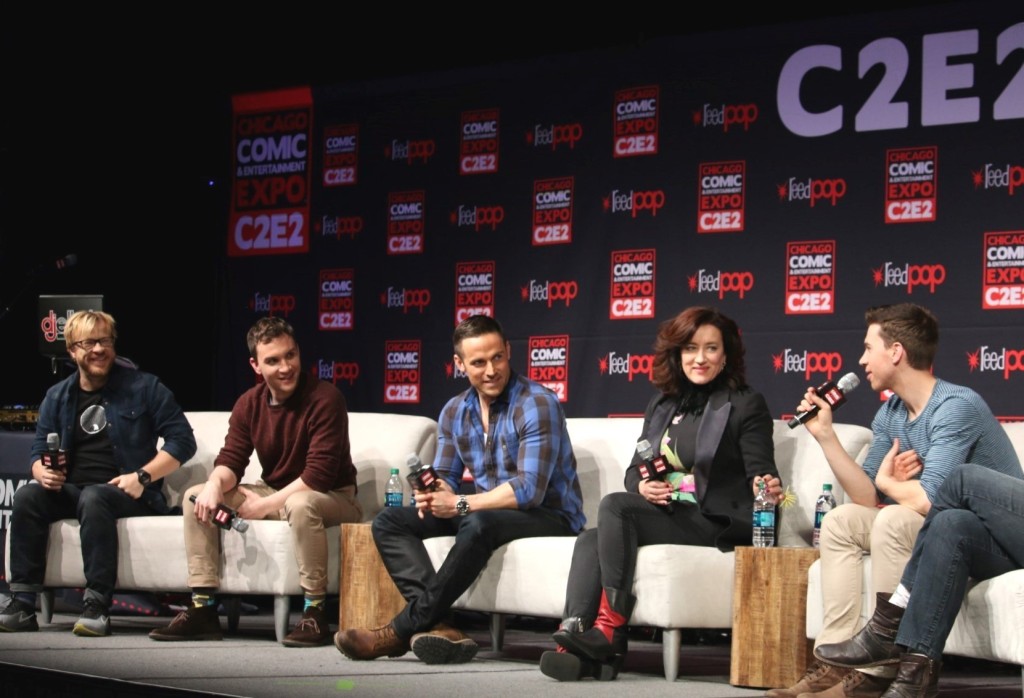

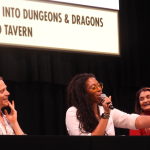

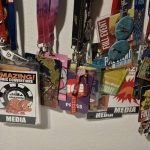

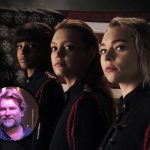
I love the show and who plays in it